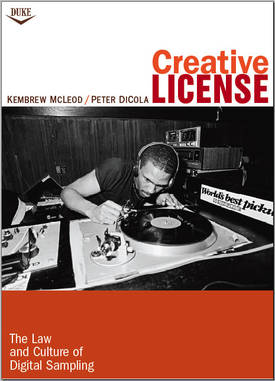
Kembrew McLeod and Peter DiCola's Creative License: The Law and Culture of Digital Sampling is a fantastic and deep look at the business, art, culture, ethics, history and future of musical sampling. The authors — respected academics/writers/filmmakers — undertook to interview a really amazingly wide spectrum of people involved in music production, and what emerges is a clear picture of how legal rulings, historical accidents, musical history, good intentions, naked greed, and conflicts of all kind came to produce our current, very broken system for musical sampling.
The interview subjects in Creative License include all manner of business people (managers, industry lawyers, execs, lobbyists, producers), musicians who want to sample but can't legally do so, musicians who got away with it before the law caught up with them, musicians who benefit from sampling licenses, musicians who've lost big due to licensing fees and lawsuits, musicians who think that sampling is a legitimate form of creativity, musicians who think it's a lazy way of making art; musicians who think that they should have the power to decide who might sample them and musicians who think that's absurd. They also talk to musicologists, lawyers (academic and commercial), economists, and so on — producing a remarkable, in-the-round picture of the state of things as they stand.
A few clear truths emerge. When sampling works, it produces works that lots of musicians and fans love — art that is both critically and commercially successful. The early days of sampling — when the law wasn't very developed and no one was sure what was and wasn't legal — yielded extraordinary albums that can't be produced legally today (the authors make a pretty compelling case that an artist would have to be insane to produce a song with more than one or two samples in it). When the market for commercial sample licensing is working — when it's not being hijacked by lawyers and labels — it can produce real commercial benefit for poor artists and their descendants, and these are often Black artists who got screwed by their labels when their music was originally recorded. Finally, all music is and always has been derivative, and there's no special creativity or lack thereof inherent to using or not using samples.
How screwed up are things? The best example of this is a back-of-the-envelope calculation of the cost to clear the samples on two of the best-loved, uncleared albums of all times: the Beastie Boys' Paul's Boutique and Public Enemy's Fear of a Black Planet, both of which typify the kind of album that couldn't possibly be made today. By the authors' math, Black Planet would lose $6.8 million in sampling fees on 1.5 million sales; Paul's Boutique would lose an eye-popping $19.8M on its sales of 2.5m. (Kembrew and his publisher were kind enough to supply the chapter in question, along with the notes).

The authors conclude Creative License with a fairly depressing look at solutions — voluntary, technical, legislative, artistic — to the sampling deadlock. None of these are very convincing, but practically any of them would be preferable to the status quo.
Books about copyright usually focus on either art or law or business, but it's a rare book that manages to equally weight all three considerations — Creative License gets it right. It's a fascinating and important read.





